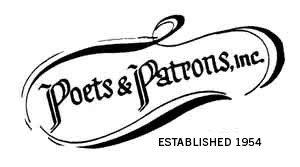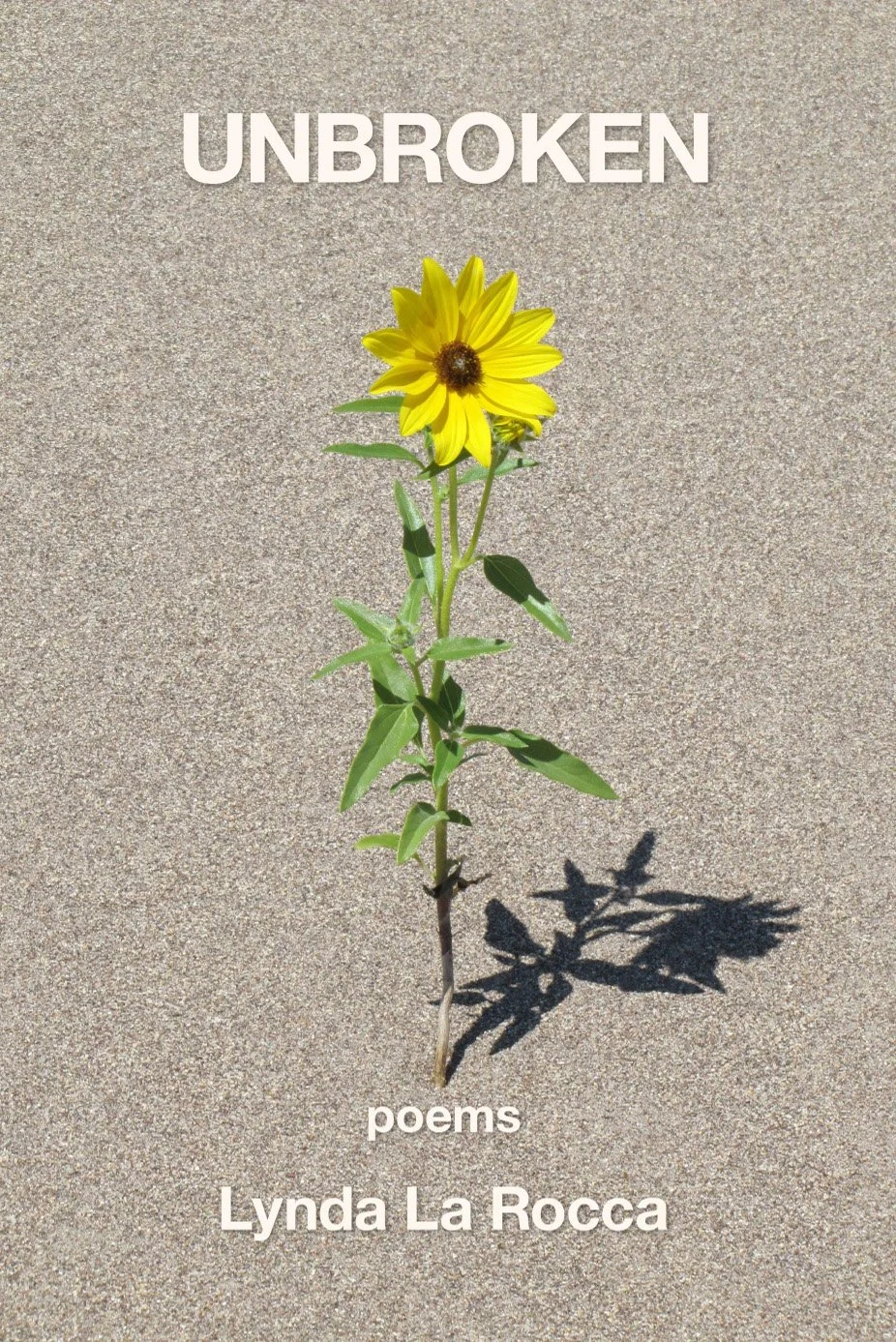Lynda’s latest collection, Unbroken, can be ordered through Kelsaybooks.com, Amazon, or directly from the author ➞
Lynda La Rocca is a New York City-born poet and freelance writer who has also worked as a reporter for the Asbury Park (NJ) Press and a teaching assistant at Colorado Mountain College in Leadville, Colorado.
Her four poetry chapbooks include The Stillness Between (2009, Pudding House Publications), Spiral (2012, Liquid Light Press), and Unbroken (2023, Kelsay Books); her individual poems have appeared in such publications as The New York Quarterly; THINK: A Journal of Poetry, Fiction, and Essays; Stone Gathering: A Reader; and Encore (National Federation of State Poetry Societies, Inc.). Read more ⟶
When did you begin writing poetry?
I wrote my first poem when I was in second grade. And I still remember it:
When I was walking down the street
I saw a turtle at my feet.
He was in flowers
That were near some towers.
I always loved rhyme and rhythm and was obsessed with song lyrics as a child. I had (and still have) a great memory, and I’d memorize songs I’d hear on the radio, which I thought was easy because the lines all flowed and rhymed. I also wrote short, short stories. I just loved putting words to paper; I was very shy and introverted and writing allowed me to express myself in ways that I never could verbally. A couple of years later, though, I pretty much lost interest in poetry—until . . . and that leads directly to question #2.
What triggered your interest in creating poems?
In my sophomore year in college, my roommate and dearest friend was constantly writing poems. She’d be scribbling between classes and sitting up in bed at night to write some more. I saw how completely absorbed June became while writing and how much she was enjoying herself and thought, this looks like fun; I’m going to try it, too. And the rest, as they say, is history!! 😉 Seriously, I rediscovered through June how much I loved the written word (this was before there was anything called “spoken word”). I even changed my major to English. Although I didn’t write poetry steadily until I was in my late 20s, I’d found my perfect fit.
Who are your favorite poets?
There are so many outstanding poets in this world—I feel like I’m always discovering work by a poet who was previously unknown to me and marveling at how much talent is out there (and how little I know even when I think I know something about poetry)—that it’s hard to choose a favorite or favorites. But since I need to narrow it down here, I’d say Sylvia Plath because—well, how could anyone not be awed by her work? It’s so astounding and genuine, cut-to-the-bone deep, insightful, and fearless. I also love Mary Oliver and Billy Collins for many reasons but one is their amazing ability to be accessible, no matter what subject or theme they’re tackling. They can, and do, speak to everyone, including those who say they “don’t get” poetry. And I do love W. H. Auden:
He was my North, my South, my East and West,
My working week and my Sunday rest,
My noon, my midnight, my talk, my song;
I thought that love would last forever: I was wrong.
God, I wish I could have written that. But since I didn’t, I’m so glad he did.
What inspires you? Other poets, painting? Music?
Everything inspires me, I’m not kidding or exaggerating. Sometimes it’s something I see—these deep-pink blossoms on the trees in spring in a park near our house, a songbird pinned down and killed by a hawk, a dearly departed pet dog. Other times it’s things that people say. Or it’s a single word or phrase that I just like the sound of so I shape a poem around that. Often, it’s a memory, or trying to come to terms with a memory. Or it’s me trying to put myself in the place of another, trying to feel and understand what it’s like to be that person. Also, for me, poetry is frequently a very-inexpensive-by-comparison form of therapy. I love using my past as a jumping-off point and creating a poem based on something that really happened, although I usually take some (or a lot of) poetic license because real life is not always as dramatic or ridiculous as I want it to be in my poem/s.
Where have you published?
I’ve published four non-author-subsidized poetry chapbooks or hybrid chapbooks (the latter two are hybrids, perfect-bound but chapbook length). The most recent, Unbroken, just came out in March 2023 and was published by Kelsay Books in Utah. It consists of all formal poems, mostly sonnets, and I’m very proud of it. I love to write in form; sometimes when I’m immersed in the dreaded writer’s block, I write in form because the constraints are, paradoxically, freeing. The form forces me to think more clearly and figure out what I really want to say.
I’ve also published individual poems in venues that include Frogpond (Haiku Society of America), U.S. Catholic, The Colorado Sun, Light Year (now Light magazine),
and numerous regional, state, and national poetry anthologies and journals, including Encore, the annual anthology of the National Federation of State Poetry Societies, Inc.
Are you in a feedback group that meets regularly? If so, how often?
It’s not a feedback group, per se, but I’m a member of the Shavano Poets’ Society, which is a chapter of Columbine Poets of Colorado, our state poetry society. We meet monthly here in Salida, Colorado, where I (and most of our 25 members) live. We’re not a critique group; instead, members take turns choosing and providing monthly assignments that can range from writing a traditional villanelle to making up Christmas-carol parodies. Then we share our work, and our most recent poetic accomplishments, with each other. We have a wonderful time together—we’re like a big family that actually likes each other.
I also recently joined Poets & Patrons and I’m really happy I did. P&P is filled with very talented poets. And I’ve already taken part in several activities (via Zoom since I live in Colorado) that were such fun and so helpful.
We know every poem is different but–on average–how many revisions does one of your published poems require?
That’s difficult to say. Once in a while, I get what I call a “miracle poem” because it somehow comes to me pretty much intact and needs little or no revision. But more often (way more often), I continue to revise poems for months or years. Sometimes, that involves just a tweak here and there; other times, the revisions are significant. And then there are the poems that are beyond hope. I keep those, nevertheless, but I know better than to send them out.
Do you gear some of your work toward performance poetry rather than the written form? Why or why not?
I’ve been a member of a five-person performance poetry troupe, the River City Nomads, from its founding in 2004 to 2023. We performed throughout Colorado at a number of different venues, from festivals and conventions to bookstores and community colleges. One of our members died last September so we’ve decided to disband after this year—we’re planning a “Last Waltz”-style performance or two in her memory. So yes, I definitely gear some of my work toward performance. What I always try to do, though, is write poems that can be both read on the page and performed. And that’s not as hard as it may seem. After all, we poets perform every time we read before an audience. And frankly, poems need to work both ways. I don’t divide my poetry into “page or stage”—that seems very limiting. And I always, always read a poem out loud before submitting it somewhere or including it in a reading. One thing I dislike is the trend in spoken-word, performance, or slam poetry of not actually saying anything meaningful while giving such a powerful performance that the audience doesn’t notice the emptiness of the actual words—until or unless that poem is put on the page. These types of poems rarely make it to the page, however, and I believe the meaninglessness is why. Smoke and mirrors in poetry does a dangerous disservice to the art we all love.
How long might you struggle with a poem that doesn’t seem to want to come together?
Again, that’s difficult to say. I’ll go on for years if there’s something about the poem that I like or if I intuitively feel it has potential. I won’t give up on this kind of poem until I’ve shaped it into what I want. Other times, it’s obvious that a poem just isn’t good and tearing it apart or reshaping it isn’t going to make it any good. I think having self-awareness and an ability to be brutally honest with oneself is a prerequisite to being a poet. If my poem isn’t working, I have to be willing and able to admit that. Not every poem is good just because I wrote it.
Is there a special person in your life you’re inclined to share your work with? Explain.
My husband Steve Voynick. He’s my best critic. He’s unstintingly honest, and he always tells me when something doesn’t work, whether it’s a word or a line or an entire poem that just doesn’t “do” anything for him. Being a highly sensitive soul, 😉 my first reaction is usually to get mad at him. (How dare you criticize my baby???) Thank God that never stops Steve, though. And almost always, after putting the poem aside and calming down, I’ll reread it and realize that he’s absolutely right. Steve is the author of ten nonfiction books; he greatly appreciates poetry but rarely writes it (except for some very funny light verse). I don’t know what I’d do without him—in every way, including poetry.

